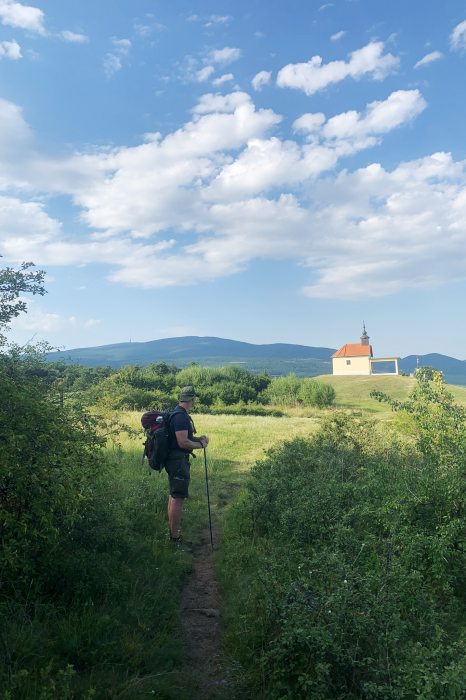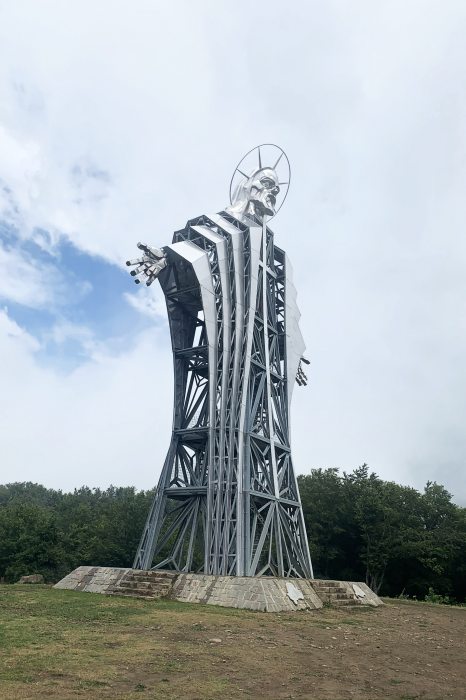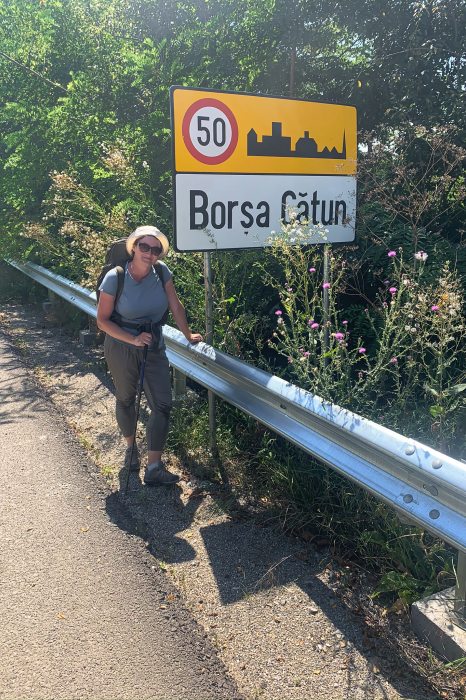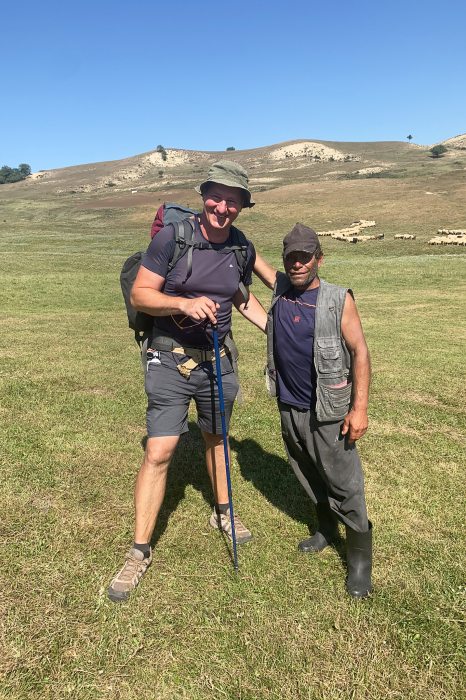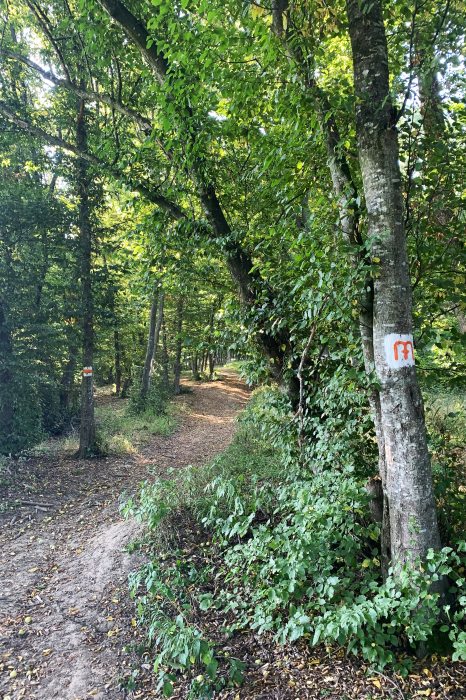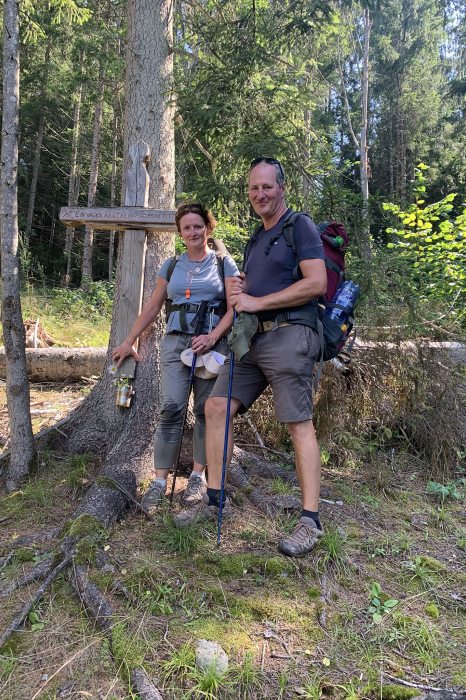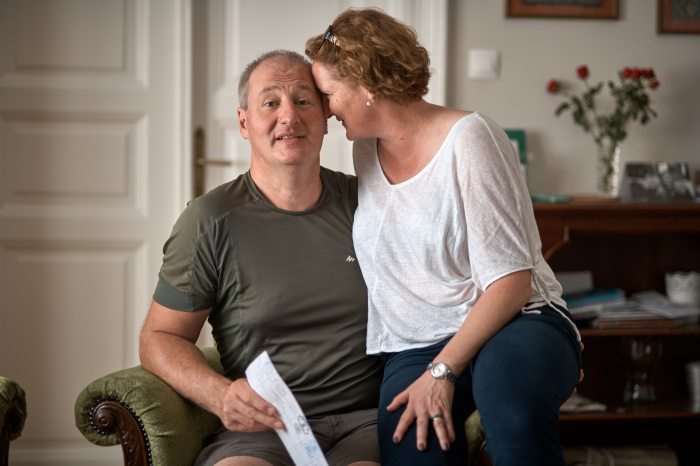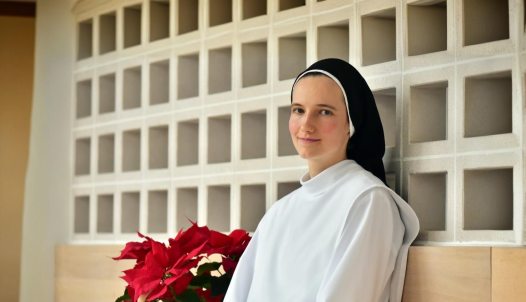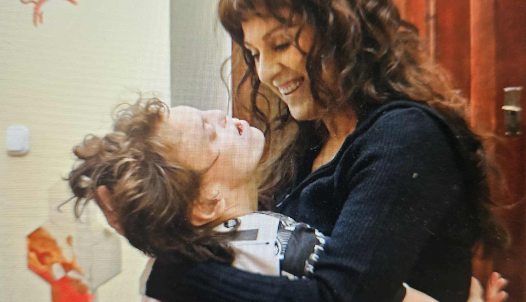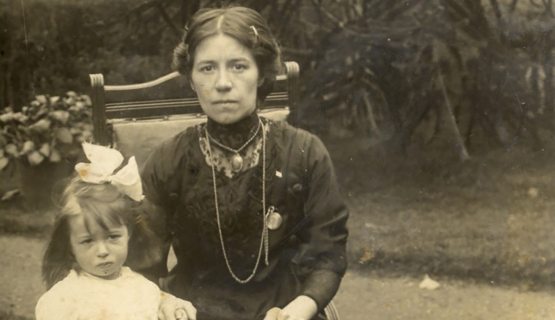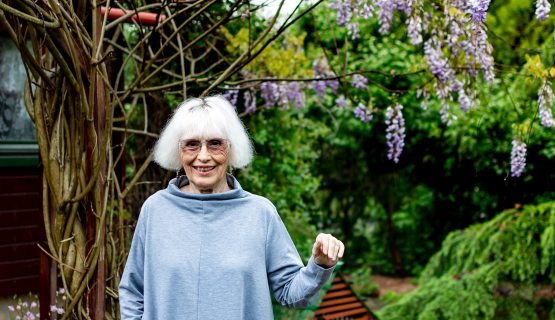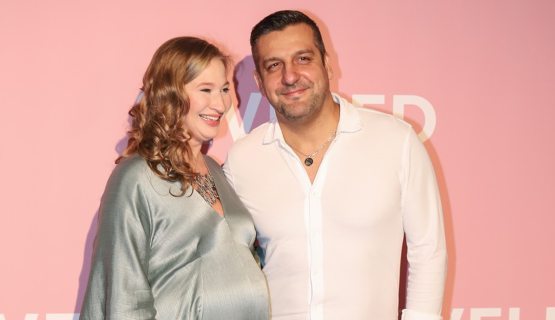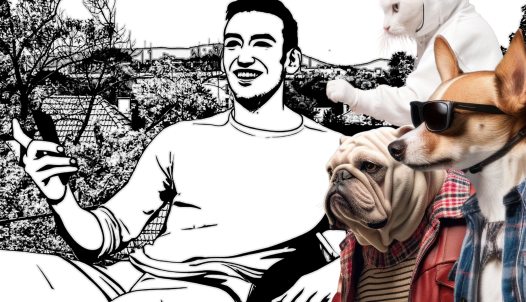"Hello, Jesus, the Molnárs are here" – Kata Molnár-Bánffy and Gábor Molnár, a couple going on a pilgrimage
When I asked, “Whose idea was it for you to start it?” they looked at each other and smiled – they both remember it as their own. We saw the same two conspiratorial, clinging gazes - despite the heavy backpacks, the heatwave and the swollen ankles - when we surprised them on the paved road in the village of Aszaló, for a friendly hug. Gábor Molnár and Kata Molnár-Bánffy returned in August 2020 from the great adventure of their marriage. They walked from Budapest to Csíksomlyó (Sumuleu, in Romanian) on the pilgrims’ route ‘Via Mariae’ over five weeks; a total of 815 kilometres.
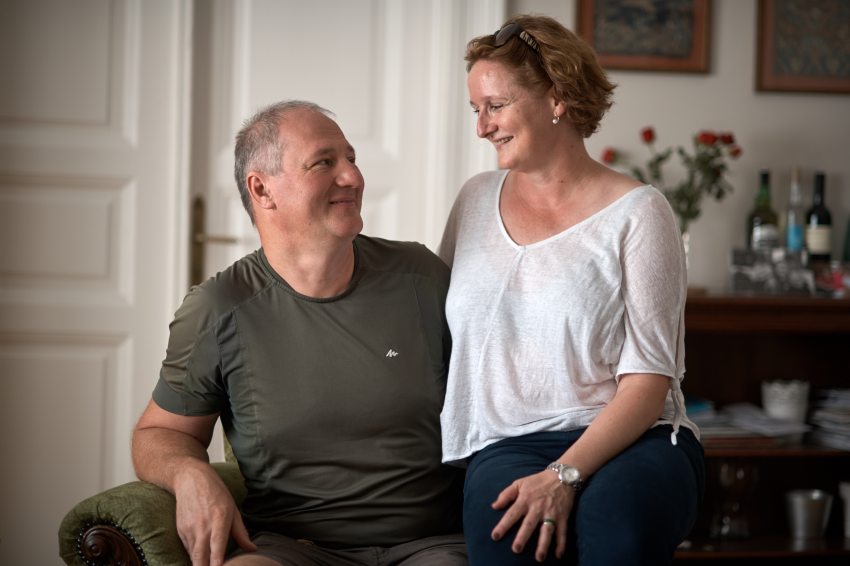
Gábor Molnár and Kata Molnár-Bánffy - Photo: Tamás Páczai
Kata: During the quarantine, we walked a lot in Leányvár in the evenings. Usually, we made our way to the cross on the outskirts of the village, and we came to realize how good those walks felt to us both. What motivated us most was that last year, we underwent a major relationship crisis. We attended counseling, which helped and, as we did not want therapy to be the great joint adventure of our marriage, we wanted to overwrite that with some powerful experience.
Do you feel that counseling was a good preparation?
Kata: In a relationship that is in acute crisis, a joint pilgrimage is unlikely to be a good idea because critical things might only deepen more under extreme conditions. I read about one pilgrim couple who argued all the way.
What was easy and what was hard to leave home?
Gábor: For me, I think it was easier because I didn’t think about its significance. My tactic was that, once we had made the decision, we would also arrange the details, work, children, the home, and the garden.
My dad is over ninety years old and has been paralyzed for a couple of years. He uses a wheelchair and we can’t telephone him because his hearing is very bad. That’s why we took stamps with us and sent him regular postcards.
Did everyone support your plans?
Kata: We asked our children for permission to leave them for five weeks in the summer when decent parents take their children on vacation. Our older sons and our 11-year-old daughter let us go on condition that they would not be under the supervision of their grandparents but would be independent. They managed very well and we are proud of them. Our 18-year-old son even paid attention to the emotional needs of his siblings. Not everyone was enthusiastic though, I was slightly hurt that some people in our family were skeptical and started listing impediments rather than encouraging us. But, by then, we had already decided to go.
Gábor has always been a great hiker, Kata is less enthusiastic about under canvass excursions. Does that also mean that Gábor was the leader and inspirer the whole time?
Kata: Yes, the classic male-female dynamics were re-established somewhat between us... He planned and followed the route and I could always rely on him. And sometimes he also carried my, much lighter, backpack, too.
Gábor: The key to success was not to complicate anything, but to help her. For the first two weeks, we had some leeway on planning the trip but on the Transylvanian section, we had to keep the schedule tighter. Meals also required planning. Once, we heard that a Village Hall had a well-equipped kitchen, and indeed it had: equipped with a hundred plates and forks -but no cooking pot, so we baked the planned ‘lecsó’ on a baking tray in the gas oven. In the end, it turned out so delicious that we decided to always make it that way in the future.
Kata: We prepared ourselves for the eventuality of sleeping on the veranda of an empty holiday home or in a bus shelter if we could not find accommodation, but that was not necessary. Yet there were scary parts.
In Székely Land, you must watch out for bears, but passing through areas protected by large, angry sheepdogs was an even more realistic danger. Then, Gábor was indeed a classic, strong protective man.
Is a strong man not afraid in such situations?
Gábor: I wouldn’t say that, but one tries to adapt dynamically to situations. For example, people have completely contradictory beliefs about sheepdogs. The goal, in short, was to be able to pass without being bitten. In the end, we always managed it ... I did not give in to weakness, thinking that Kata needed my care now to be able to complete the trip.
Reliance is the basic experience of a pilgrim; you must be open not only to your partner and to the weather, but also to the local people. You arrived as strangers and often left as friends.
Kata: We didn’t expect those friendships. Many enthusiastic volunteers work on the ‘Via Mariae’, especially on the Transylvanian section. They kept passing us on and, even days later, text messages would come from a priest or the wife of a minister, asking us where we were, whether we had arrived and whether we were well.
Kata, both sides of your family comes from Transylvania and you still have active ties there. Was it important for you to conquer this land on foot, too? Was it also a journey into the past?
Kata: No, it really did happen very much in the present. When you walk overland from village to village, over hill and valley and meet the people living there, you build a particularly intimate relationship with the countryside, the country and the land. If I can put that emotional energy into my own country and also get that back from it, why would I seek the same in a foreign landscape? That’s why we are glad we didn’t choose the Camino. Even though you have studied in geography the fact that the great Hungarian Great Plain extends into today's Romania or that the sand of the Nyírség really pulls on your soles and how different it is from the clay soil, on such journeys, you experience it for yourself. Or, if you walk under the blazing sun for four days, and see only an occasional tree because you are on the Transylvanian Plain and not in a forest…
There are many anecdotes about the brevity of conversation of a person living among nature. How much did you talk?
Kata: Gábor expected that we would talk more, though I was often terribly grateful to him that we could walk in silence. At first, because I struggled a lot with pain in my leg and my frustration that I was having a hard time, I didn’t have the energy to talk much. Later, I noticed the intense processes that those struggles induced in me. And Gábor let it be. It was only at home that he said he felt we did not talk enough, and we’ve been trying to make up for it ever since.
It is very rare that a couple shares a spiritual experience. Did you succeed?
Kata: I knew the pilgrimage would be a good trip experience and I also hoped it would do our marriage good, though I never really dared set myself the goal of a real, deep, spiritual adventure. It is hard for me to declare such a thing, I fear disappointment. Even already in Rákosszentmihály, when asked, Gábor said that we were going to Csíksomlyó and I typically dared make the same declaration only in Székely Land. I wanted to avoid failure and was not sure whether we could achieve a real spiritual experience. I had to do something about that though because it was obviously not an adventure tour but a pilgrimage. Pilgrim groups pray and sing at every cross and church. When we saw the first church while walking out of Budapest, we were a little confused as to what to do…
Gábor: I read about an African guy who grew up in a Christian mission and, when he had to go to hospital, he was asked why he was in such a good mood. He replied that, so far, whenever had passed a church, he had looked in and said: “Hello, Jesus, Joe is here!” and now every noon he hears “Hello Joe, Jesus is here”. We paraphrased that and,
from the first day to the last, whenever we saw a cross or a church, we said, "Hello, Jesus, the Molnárs are here."
Kata: It was a joke, a gesture that started with a distant attitude, but the Holy Spirit blows wherever it wants, and that personal address has infiltrated our lives and become a reality. It induced a dialogue within us with God appearing incarnate. Anyone to whom you can say “hello, here we are” can also be told “it makes me angry that my leg hurts so much, that was not the deal, I should be able to cope better” as well as “this hilltop ridge is wonderful, thank you… ”
Gábor: Prayer intertwined with the journey, and mass with the experience of arrival.
Kata: It’s also a special kind of spirituality when you reach such a degree of freedom that all your problems can be solved with just a little water, a sticking plaster, a sandwich, a cooling breeze or a shady bench. Existing permanently at the bottom of the Maslow Pyramid is actually a very liberating experience. On the way, we also prayed a lot for others; while still at home, we had made a decision that every day would have a prayer theme and our friends also sent intentions via Messenger or text message... For example, during the five weeks, two babies were born whose parents warned us when the prayer commando had to be started…
Picture: The inscription of the pilgrim cross on Harghita: "I am the way, the truth, and the life!"
Perhaps you needed that so that you would not think of the pilgrimage as just your luxury?
Kata: I overcame the tempting thought that what we were doing was a luxury and that not everyone can afford to go away for five weeks, leaving everything behind. But if one has any remorse about that, then that anxiety will hang over the trip, making it difficult to accept the abundance of graces around you.
Gábor:… and of course, there are other kinds of anxieties, for example, whether you will succeed, will have to give up, etc.. Once you have started you need to be happy about every day, every kilometre you complete, as that helps you get over your concerns.
Kata: There is no such thing as an invalid pilgrimage, the one-day ones and the two-week ones are all ‘valid’. Even the detour. And the missed five kilometres in the centre of Miskolc, are also valid… We wanted to be present and be there, happy to be able to make a decision again and again, and to continue the journey.
I never thought for a minute that we would stop. We prayed well “Lead us not into temptation."
Was it easy to come home?
Kata: It was great to finally see our children. At the same time, in the last days of the pilgrimage, a process of mourning began in us. Since then, barely a couple of weeks passed and the longing for the road has returned. It would be good if we could somehow incorporate it all into our lifestyles, alongside the children, work, the community, mowing the lawn and sowing the seed. We are already planning a shorter autumn trip of a few days, and have started dropping hints to our children…
